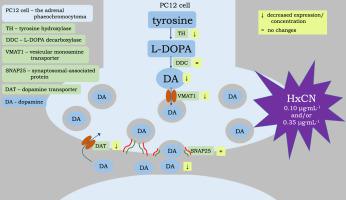Chemosphere ( IF 8.1 ) Pub Date : 2021-09-17 , DOI: 10.1016/j.chemosphere.2021.132284 Malwina Lisek 1 , Tomasz Boczek 1 , Joanna Stragierowicz 2 , Julia Wawrzyniak 1 , Feng Guo 3 , Michał Klimczak 2 , Anna Kilanowicz 2 , Ludmila Zylinska 1

|
Among polychlorinated naphthalenes (PCNs), listed by the Stockholm convention as Persistent Organic Pollutants (POPs), hexachloronaphthalenes are considered the most toxic and raise the highest concern. Of these, 1,2,3,5,6,7-hexachloronaphthalanene (PCN67) is considered the main congener affecting human health due to its hepatotoxicity and its ability to disturb the reproductive, endocrine, and hematological systems. It is also prevalent in human serum/plasma, milk, and adipose tissue. However, little is known about its neurotoxicity, despite the fact that anorectic effects have been observed in workers occupationally exposed to PCNs and in animal research on PCN67. Since dopamine is involved in many aspects of food intake, the aim of this study was to confirm whether PCN67 affects dopamine synthesis in differentiated PC12 cells, a widely used model of neurosecretion. Our results show that exposure to PCN67 resulted in diminished dopamine content and release. Moreover, PCN67 also affected the expression of tyrosine hydroxylase and lowered the expression of vesicular monoamine transporter 1 (VMAT1). In addition, significantly lower expression of antioxidant enzymes, including catalase, glutathione peroxidase and copper/zinc superoxide dismutase, was observed in comparison to the vehicle. In conclusion, PCN67 appears to disturb dopaminergic transmission by altering tyrosine hydroxylation, reducing VMAT1 expression and impairing antioxidant protection. Our study provides a potential mechanism for how PCN67 may cause dopamine deficiency and contribute to neuronal death by affecting cellular antioxidant potency; however, this conclusion requires further research.
中文翻译:

六氯萘 (HxCN) 在 PC12 细胞体外模型中损害多巴胺通路
在被斯德哥尔摩公约列为持久性有机污染物 (POPs) 的多氯萘 (PCN) 中,六氯萘被认为是毒性最大的,也是最受关注的。其中,1,2,3,5,6,7-六氯萘 (PCN67) 由于其肝毒性和干扰生殖、内分泌和血液系统的能力而被认为是影响人类健康的主要同系物。它在人血清/血浆、牛奶和脂肪组织中也很普遍。然而,尽管在职业暴露于 PCNs 的工人和 PCN67 的动物研究中观察到厌食效应,但对其神经毒性知之甚少。由于多巴胺涉及食物摄入的许多方面,本研究的目的是确认 PCN67 是否影响分化的 PC12 细胞中的多巴胺合成,一种广泛使用的神经分泌模型。我们的结果表明,接触 PCN67 会导致多巴胺含量和释放减少。此外,PCN67还影响酪氨酸羟化酶的表达并降低囊泡单胺转运蛋白1(VMAT1)的表达。此外,与载体相比,观察到抗氧化酶(包括过氧化氢酶、谷胱甘肽过氧化物酶和铜/锌超氧化物歧化酶)的表达显着降低。总之,PCN67 似乎通过改变酪氨酸羟基化、降低 VMAT1 表达和削弱抗氧化保护来干扰多巴胺能传递。我们的研究为 PCN67 如何导致多巴胺缺乏和通过影响细胞抗氧化效力导致神经元死亡提供了潜在机制;然而,这一结论需要进一步研究。











































 京公网安备 11010802027423号
京公网安备 11010802027423号